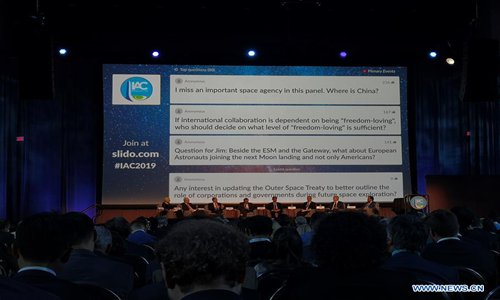HOME >> CHINA
US 'weaponizes' visa policies, hinders normal international exchanges
By Deng Xiaoci Source:Global Times Published: 2019/10/23 17:23:09
Chinese delegates absent from 70th International Astronautical Congress

"I miss an important space agency in this panel. Where is China?" Attendees at the plenary of the ongoing weeklong International Astronautical Congress (IAC) here brought the question atop the panel voting system. Photo: Xinhua
The Chinese Foreign Ministry on Wednesday blamed the US for using its visa policy as a weapon to hinder normal international exchanges and communication after the US failed to issue visas to the Chinese delegation on time, leading to China's absence from the ongoing 70th International Astronautical Congress (IAC) in Washington.
Foreign Ministry spokesperson Hua Chunying made the remarks at a press conference on Wednesday, following the noticeable absence of Wu Yanhua, vice administrator of the China National Space Administration for his planned Monday plenary at the IAC.
Hua said that besides Wu, other Chinese delegates, including the vice president of the China Aerospace Science and Technology Corp, who is also a deputy head of the International Astronautical Federation (IAF), IAC's organizer, and the general secretary of the Chinese Society of Astronautics also failed to obtain US visas.
The Chinese space agency official's no-show and the US government's inclusion of international space collaboration highlighted by US Vice President Mike Pence's speech at the IAC's opening ceremony have aroused wide concerns among the international space community and Chinese space enthusiasts.
According to the IAC official press kit released on October 17, Wu was scheduled to address a Monday plenary called Heads of Agencies, together with his international counterparts, such as Jim Bridenstine of NASA. However, the Chinese space official was conspicuously absent, the Xinhua News Agency reported.
"I missed an important space agency in this panel. Where is China?" Attendees at the event raised the question to the panel voting system and demanded an answer.
Pascale Ehrenfreund, the incoming president of the International Astronautical Federation (IAF), IAC's organizer, attributed Wu's no-show to "time conflict," but some attendees at the meeting hinted at a "visa problem," the report said.
A senior Chinese official from the space domain close to the matter, who requested anonymity, also confirmed with the Global Times on Wednesday that the "visa problem was one of the prime reasons [for Wu's absence,] among other issues. It's difficult to elaborate on this."
"Visa records are confidential under US law. We are unable to discuss individual cases," a US Embassy spokesperson told the Global Times on Wednesday via email.
Hua stressed that "the US has for some time been denying visas to, delaying processing visa applications of, revoking long-term visas for, and searching and harassing Chinese scholars, students, entrepreneurs and scientists, which obstructs normal China-US people-to-people exchanges, damaging the interests and legitimate rights of Chinese personnel."
A total of 30 Chinese scholars had their US' visas canceled last year, or put on administrative review, the Global Times previously reported.
The US is weaponizing visas, neglecting its international responsibility and duties, Hua noted. "We urge the US to seriously reflect on this and make corrections."
China hosted the IAC in 2013. At IAC 2018 in Bremen, Germany, China Aerospace Science and Technology Corp and China Aerospace Science and Industry Corp, two rocket-making giants, made an impact when they showcased their latest technologies, but they didn't appear at the ongoing Washington conference either, Xinhua report.
The anonymous official added that the IAC is more about collaboration among governments and their space agencies. China's two rocket-making giants participated at the events as members of the Chinese Society of Astronautics.
An employee surnamed Xu from QHYCCD, a Beijing-based telescope maker, confirmed with the Global Times on Wednesday. "Only two marketing department employees got their visas on time, and one of them is Bi Tingting."
Bi Tingting, the startup's sales manager, has told Xinhua all technicians with her company had failed to get a US visa.
"One of our technicians only got his visa on Tuesday. He missed the Monday opening of IAC and will travel to the US for the rest of the event," Xu said.
Pence's claim that his country would only "work closely with like-minded, freedom-loving nations, as we lead mankind into the final frontier, was soon followed by a letter condemning the inclusion of Pence by some 200 people for the country's astronautical community, Xinhua said.
Jan Woerner, director general of the European Space Agency, also disagreed with Pence. He told Xinhua that "I'm not stopping cooperation with others because they don't think like me. On the contrary, because they don't think like me, so I'm going to cooperate."
"Why not work with China on the 'international' Gateway (a US moon-orbiting lab to be built) like we have with Russia for decades?" "If international collaboration is dependent on being 'freedom-loving,' who should decide on what level of 'freedom-loving' is sufficient?" Those two questions from the audience were also highlighted in the voting system on Monday
The so-called American freedom is full of prejudice. And the visa problems are an obvious show of the US government's short-sightedness and narrow-mindedness, Chinese observers said.
Some netizens even called for a boycott of IAC events in the US, saying "if CNSA is not allowed to go, Chinese companies should skip it."
Newspaper headline: US ‘weaponizes’ visa policy, hinders ties
Posted in: DIPLOMACY